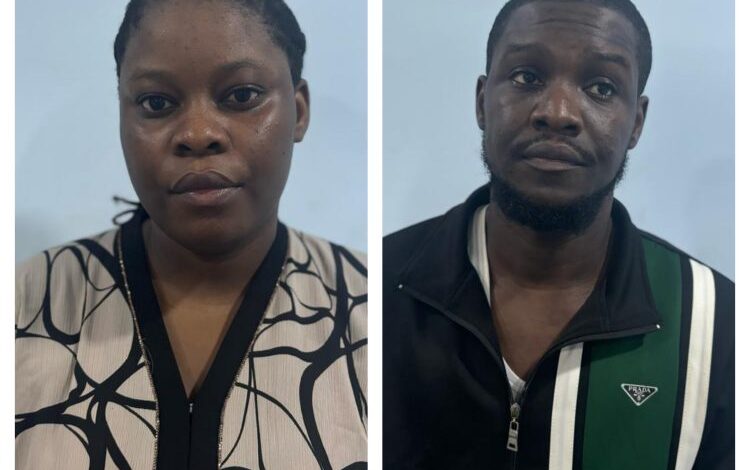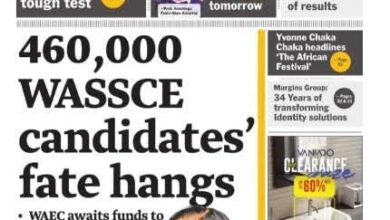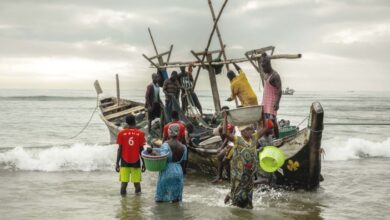Two Nigerians sentenced to 18 years for trafficking young women

Two Nigerian nationals have been sentenced to a total of 18 years in prison—nine years each with hard labour—by the Achimota Circuit Court for trafficking two young Nigerian women into prostitution under the false promise of securing them domestic jobs in Ghana.
The convicts, Jessica Daniel alias Blessing, a 24-year-old hairdresser, and Kelvin Johnson alias Alaska, a 30-year-old Bitcoin trader, were found guilty on three counts—conspiracy to commit a crime and two counts of human trafficking—after a full trial presided over by Her Honour Akosua Anokyewaa Adjepong on Friday, April 29, 2025.
The charges were brought under Section 2(1) and (2) of the Human Trafficking Act, 2005 (Act 694), as amended by the Human Trafficking Act, 2009 (Act 784), and Section 23(1) of the Criminal Offences Act, 1960 (Act 29).
According to the prosecution, led by Assistant Superintendent of Police (ASP) Isaac Babayie, the case was triggered by a report from Chief Calistus Elozipuwa, a member of the Nigerians in Diaspora Organisation (NIDO), based in Ghana. On July 1, 2024, Chief Elozipuwa rescued two young women—Gloria Vincent alias Grace, 20, and Gloria Igbetar alias Diamond, 25—who were engaging in prostitution in Accra.
When questioned, the victims revealed they had been lured and deceived by Jessica Daniel earlier that year under the guise of obtaining jobs as domestic workers in Ghana. Kelvin Johnson, acting as her accomplice, linked the victims to an agent in Nigeria, arranged their travel, and received them upon arrival at the Accra lorry station. He then transported them to an apartment in Nungua, where they were held and forced into prostitution.
Jessica, who acted as the mastermind, demanded GH¢8,000 from each of the victims to “buy” their freedom. Investigations revealed she concealed her true role, claiming she feared retaliation if the victims discovered she was the one exploiting them. The proceeds from the prostitution were collected by Kelvin, who then handed them over to Jessica.
The victims were subjected to inhumane treatment, including being forced to swear oaths on a Bible and having their pubic hair cut—rituals meant to frighten them into submission. The court heard that both women eventually paid the full amount demanded by their traffickers.
Following their arrest by the Anti-Human Trafficking Unit of the Criminal Investigation Department (CID) of the Ghana Police Service—working in collaboration with the non-governmental organisation Our Rescue Ghana—both Jessica and Kelvin admitted to trafficking the victims from Nigeria to Ghana for the purpose of sexual exploitation.
Though they pleaded not guilty in court, the prosecution presented compelling evidence, including the testimonies of three witnesses. A pregnancy test conducted on Jessica before sentencing came back negative.
In sentencing the convicts, Her Honour Adjepong acknowledged their status as first-time offenders and considered the period they had already spent in custody.
However, she stressed the gravity of the crime, the psychological harm done to the victims, and the convicts’ lack of remorse.
Meanwhile, police investigations are ongoing to identify and apprehend other suspects connected to the trafficking ring.
DSP William Ayariga, Director of the Anti-Human Trafficking Unit, lauded the court’s decision and reaffirmed the unit’s commitment to combating human trafficking in Ghana.
“Ghana is not a safe haven for human traffickers,” he said. “Let this be a warning—those who lure vulnerable people into Ghana and force them into prostitution will face the full force of the law. They can run, but they can’t hide.”
He added that in 2024 alone, the unit secured nine convictions, including a record 20-year sentence—the highest handed down under the Human Trafficking Act to date.
“We are not slowing down,” DSP Ayariga emphasized. “We will continue arresting, investigating, and prosecuting offenders. No form of human trafficking or migrant smuggling will be tolerated in Ghana. Justice will prevail.”
The two victims are currently receiving psychosocial support and reintegration assistance through the appropriate state and Our Rescue Ghana (ORG) support services.
Source: myrepubliconline.com




